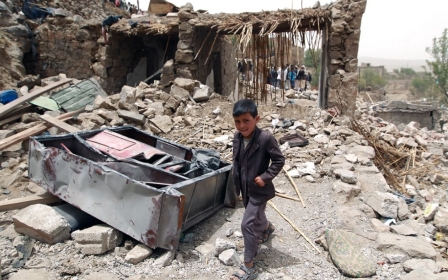'We were prisoners': Yemeni Jews rescued in secret Israeli mission

BEERSHEBA, Israel - Days after being evacuated in dramatic circumstances from Yemen’s civil conflict by the Israeli army, Yemeni Jew Yehiya Zindani is trying to process his drastic change of circumstance.
At a centre for new immigrants in the southern Israeli city of Beersheba, Zindani smiles at the sight of children dressed in traditional costume celebrating the Jewish holiday of Purim.
“In Yemen, we celebrated our holidays quietly. There we were prisoners,” recalled Zindani, who arrived in Israel late on Sunday night with 18 other Yemeni Jews.
The group were quietly taken from the country in a secret mission that media says marks the end of a historic Jewish presence in war-torn Yemen.
Zindani, like many of the other new arrivals, said he plans to visit relatives who already live in Israel. But he will also visit the grave of his father, Aharon, who was murdered in 2012 at a market near their former home in Sanaa, the Yemeni capital.
A Yemeni Muslim who had accused Aharon Zindani of practicing witchcraft, approached him from behind as he bent down to pick up a bunch of vegetables. He swiftly stabbed him Yehiya’s father in the neck and stomach before fleeing the scene.
Four hours later, Zindani’s father succumbed to his wounds in hospital, and his remains were flown to Israel, along with several relatives, for a Jewish burial.
“The killer said that he had been sent by God to kill a Jew,” said Zindani, who along with all the capital city’s Jews lived in a protected enclave near the US embassy. The remainder of Yemen's ancient but fast-dwindling Jewish population lives in Raydah, a market town some 75 kilometres from Sanaa.
Despite the dangers, some 50 Jews still remain in Yemen and have refused Israel’s offer to emigrate, according to the Jewish Agency, a non-profit organisation that works in coordination with the Israeli government to facilitate immigration - or “aliyah”, literally “ascension” in Hebrew - to Israel.
While the Jewish Agency said that it would continue to assist any Yemeni Jews who later decided to leave the country, chairman Natan Sharansky described the latest evacuation as the end of an era.
“A chapter in the history of one of the world's oldest Jewish communities [has come] to an end. But Yemeni Jewry's unique, 2,000-year-old contribution to the Jewish people will continue in the State of Israel.”
In the past few days, the new arrivals - men dressed in typical Orthodox garb and women with their hair covered, some in burqas - have spent their first days in the country attempting to navigate a foreign bureaucracy and a labyrinthine process of filing papers.
Many said that despite the daunting challenges ahead, however, that they have great hope that younger family members will study and find good jobs in Israel.
A first step in integration is attending Jewish Agency-sponsored classes in modern Hebrew, a dialect that is vastly different from the ancient Hebrew spoken in Yemen.
Zahra Dahari, 23, has learned Hebrew since arriving two years ago, but her husband divorced her and she has been unable to find housing or a job in Israel. Making matters worse, a housing crisis has seen rent levels soar throughout the country.
"I don't know what to do," she said.
"I didn't expect that it would be so hard here, the culture is different. In Yemen, there is much modesty; in Israel the women dress very exposed," said Dahari, wearing a black headscarf and cooking fava beans on an improvised stovetop.
But she maintains that life is still better in Israel. "In Yemen, people would kill Jews; we were afraid to go to the synagogue. At least here in Israel, we are in our own country," she said.
Instability and violence in the wake of the Arab Spring uprisings in 2011 has seen a trickle of Yemeni Jew refugees turn into a swelling tide.
A descent into civil war that began in 2014 has only accelerated the trend, with Yemeni Jews saying they are increasingly being targeted.
In the past few years, 200 Yemeni Jews have been airlifted from Yemen. Exact details of the operations are not known due to the secrecy of the missions.
"We came here for my children, we saw that they weren't studying there in Yemen," said Yehiya Marhabi, a Jewish Agency representative who arranged the recent airlift. He arrived from Sanaa 10 years ago, but has returned to the country periodically since then to find that "things there have gotten worse, with ISIS, al-Qaeda, and all of those groups that threaten the Jewish community," he said, referring to the Islamic State (IS).
Yemeni Jews have left a “failed state that has fallen through the cracks, where al-Qaeda, IS and a whole supermarket of radical Islamists are taking advantage of the chaos and bringing about a new level of ethno-religious divisions,” said Uzi Rabi, director of the Moshe Dayan Center for Middle Eastern and African Studies.
An ancient community
For centuries, the Jews of Yemen made up the country’s merchant class and prided themselves on being one of the oldest and most vibrant Jewish communities in the Arab world. They maintained their traditions in a tight-knit community, teaching recitation and memorisation of ancient Hebrew religious texts, even when schoolrooms consisted of only a handful of children.
Yemen Jews, who wear sidelocks and skullcaps, were easily differentiated from their Muslim neighbours by their different dialect and appearance.
The history of the Jewish community in Yemen has involved long periods of peaceful co-existence interspersed with eruptions of violence.
In 1792 senior Muslim clerics ordered the synagogues to be destroyed. Afterwards by religious decree, Jews were forbidden to wear new or good clothes, were not allowed to bear arms or ride mules, and were forbidden from wearing jewellery or carrying traditional curved daggers worn by Yemeni men. In 1932 in the port city of Aden, a number of Jews were also targeted in anti-Jewish stoning and stabbing attacks.
However, the historically fragile relationship received its biggest blow in 1947 with the establishment of the state of Israel.
That year, after the UN General Assembly voted in favour of a partition of Mandate Palestine that would make way for an Arab and a Jewish state, Yemenis rioted in Aden, killing at least 82 Jews and destroying their homes and shops. In response, Israel facilitated the immigration to Israel of some 50,000 Jews - the majority of the population - in what was known as “Operation Magic Carpet".
Until 1962, an unknown number of Jews continued to trickle out of Yemen, but with the outbreak of the civil war that year, they were unable to exit. After the first Persian Gulf War, about 1,200 Jews left again with the help of the US. Most arrived in Israel, but smaller numbers were also flown to the US and Europe.
'Curse on the Jews'
The ouster of President Abdullah Saleh in 2012 left the Jewish community in Yemen more exposed. Saleh had publicly courted Jews in order to curry favour with the international community.
They have increasingly become the target of animosity, harassment and hostility, largely from Shia Houthi rebels who overthrew the internationally recognised government last year and operate under the slogan: “God is great, death to America, death to Israel, curse on the Jews, victory to Islam.”
Such developments confirmed a rising fear among the Jewish community that the link with Israel would increasingly place them in the crosshairs.
“Even though Yemeni Jews are leaving behind an ancient civilisation, the situation is simply too dangerous,” said Rabi, adding that the dozens who have stayed behind are likely elderly people “who believe that they should die in their homeland".
For Zion Dahari, an 18-year-old from northern Yemen who came to Israel four years ago, leaving behind his customs, language and culture has created both problems and opportunity.
Dahari, who followed many of his friends to Israel, muses that while he would have been married by now if he had stayed in Yemen. However, in Israel he can instead focus on trying to get into university and building a career for himself - something he said would have been impossible in Yemen’s shattered economy.
When his father and grandfather arrived earlier this week, he advised them that the transition in Israel could be difficult and that life was very different here.
Israelis "have a completely different mentalities and behaviours, so you need a lot of patience," he told Middle East Eye.
“But we left behind everything there so we can build a new life, in a Jewish state that gives us a future."
Stay informed with MEE's newsletters
Sign up to get the latest alerts, insights and analysis, starting with Turkey Unpacked
Middle East Eye delivers independent and unrivalled coverage and analysis of the Middle East, North Africa and beyond. To learn more about republishing this content and the associated fees, please fill out this form. More about MEE can be found here.





